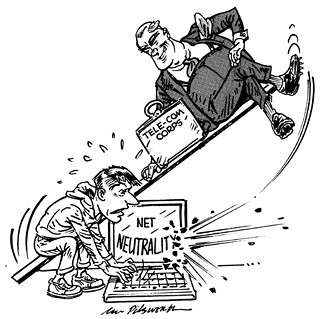“Save the Internet!” That’s the rallying cry of one of the strangest coalitions in US history. “Save the internet!” chant the trigger-happy Gun Owners of America, echoed by the lefty lawyers of the American Civil Liberties Union. The Bible-thumpers in the Christian Coalition are singing from the same “Save the internet” hymnbook as the suave sisters of the Feminist Majority Foundation. And so are an astonishing array of consumer and citizens groups, student and teacher associations, small business owners, video gamers, environmentalists, war veterans, music fans and bloggers. All are united in the struggle to stop a few giant corporations from turning the internet into a private business monopoly that they control.
Members of the coalition point out that anyone with an internet connection can create video, audio and text messages that can be seen by millions. Jane Doe’s website or blog can compete on the net with CNN’s. It’s all part of the small-d democracy that built the net we surf today. But the giant US telecommunications corporations who provide internet access want to change the rules so that they can favour companies and individuals willing to pay big bucks to get their messages out faster and with better technical quality.
“The nation’s largest telephone and cable companies…want to be internet gatekeepers, deciding which websites go fast or slow and which won’t load at all,” the coalition warns on its site, savetheinternet.com. “These companies have a new vision for the internet. Instead of an even playing field, they want to reserve express lanes for their own content and services—or those from big corporations that can afford the steep tolls—and leave the rest of us on a winding dirt road.”
The telecom giants have launched a multi-million dollar campaign to persuade US politicians to abolish “net neutrality,” the rule that gives everyone equal access to the internet. The telecoms won a victory three weeks ago when the US House of Representatives voted against including the net neutrality rule in a new telecommunications law. “I’d say that we’re halfway to the apocalypse right now,” Anthony Riddle, of the Alliance for Community Media, told Pacifica Radio. Riddle and other coalition members fear the Republican-controlled Senate will also buy the argument that net neutrality would interfere with the telecoms’ ability to finance upgrades to the internet by charging some content providers higher prices for better and faster access.
Net neutrality is an issue in Canada too. Three months ago, a special federal panel reviewing telecommunications law recommended deregulating phone and cable companies. Although the panel said customers’ rights should be protected, its recommendations would not prevent internet service providers from offering a “fast lane” to those able to pay for it. Meanwhile, the Canadian mainstream media are reporting the threat to net neutrality primarily as a business issue. How would small companies with limited budgets be able to compete on the Internet with the deep pockets of huge corporations? It’s a good question. But the threat to free expression is an important issue too. Last year, the Vancouver-based phone company Telus blocked access briefly to a website run by the striking Telecommunications Workers Union. The BC Civil Liberties Association criticized Telus for using its power “to censor a specific group, shut down debate and limit the messages conveyed about the current labour dispute.”
Many fear that if Internet service providers are given the right to routinely decide who gets access to the net, and on what terms, the web will become just another medium to promote the commercial interests of big corporations. That’s what happened many decades ago when governments handed almost complete control of the radio and TV airwaves to a handful of broadcasters. Ever since, big broadcast outfits have been treating the rest of us like passive idiots as they sell our eardrums and eyeballs to advertisers. It would be stupid to let it happen again.
email your opinion, while you still can: [email protected]















